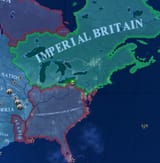Search Results
6/19/2025, 7:51:15 PM
March into Detroit
October 13, 1936
The flags of Imperial Britain flutter over Detroit, and the government of Quebec has laid down arms. Yet despite these symbolic victories, the Imperial Civil War is far from over.
A few days before the first-year anniversary of the Imperial Civil War, Automats marched into Detroit, and the Quebecois government signed documents of surrender. The war technically goes well for London, but at great cost. The Empire's finances have plummeted, its trade crippled, numerous corporations have gone out of debt. The Edison International Electronic Company, primarily an American company, shut off its mining robots the day the war broke out.
With Britain distracted, the Russian Empire entered China, still recovering from its civil war; after six months of warfare, the Taiping government collapsed, and Russia has installed Andrei I to rule over this new "Tsardom of Zheltorossiya." Trade with China, for the foreseeable future, has ended. Several corporations have filed for bankruptcy as a result.
The American Northeast is littered with broken cities and bombed out fields. Destroyed barrels and Automats litter the fields. General Montgomery's offensive into Canada succeeded, but with loss of life
that horrified Whitehall. Tens of thousands lie dead. Letters home from Imperial soldiers speak of frostbitten hellscapes, malfunctioning Automat units, and officers unable to keep morale intact.
Across the American continent, the fires of rebellion still burn hot. Philadelphia remains in rebel hands. The Appalachian corridor is a no-man’s land of bombed railways and shattered towns. In the West, Canadian partisans and American revolutionaries continue to hold key terrain in the Rockies and along the Pacific Coast. The British Expeditionary Force, overextended and under-supplied, faces daily ambushes and logistical nightmares. Victory in a few cities has not yet broken the will of the rebellion.
The war marches on.
October 13, 1936
The flags of Imperial Britain flutter over Detroit, and the government of Quebec has laid down arms. Yet despite these symbolic victories, the Imperial Civil War is far from over.
A few days before the first-year anniversary of the Imperial Civil War, Automats marched into Detroit, and the Quebecois government signed documents of surrender. The war technically goes well for London, but at great cost. The Empire's finances have plummeted, its trade crippled, numerous corporations have gone out of debt. The Edison International Electronic Company, primarily an American company, shut off its mining robots the day the war broke out.
With Britain distracted, the Russian Empire entered China, still recovering from its civil war; after six months of warfare, the Taiping government collapsed, and Russia has installed Andrei I to rule over this new "Tsardom of Zheltorossiya." Trade with China, for the foreseeable future, has ended. Several corporations have filed for bankruptcy as a result.
The American Northeast is littered with broken cities and bombed out fields. Destroyed barrels and Automats litter the fields. General Montgomery's offensive into Canada succeeded, but with loss of life
that horrified Whitehall. Tens of thousands lie dead. Letters home from Imperial soldiers speak of frostbitten hellscapes, malfunctioning Automat units, and officers unable to keep morale intact.
Across the American continent, the fires of rebellion still burn hot. Philadelphia remains in rebel hands. The Appalachian corridor is a no-man’s land of bombed railways and shattered towns. In the West, Canadian partisans and American revolutionaries continue to hold key terrain in the Rockies and along the Pacific Coast. The British Expeditionary Force, overextended and under-supplied, faces daily ambushes and logistical nightmares. Victory in a few cities has not yet broken the will of the rebellion.
The war marches on.
Page 1
